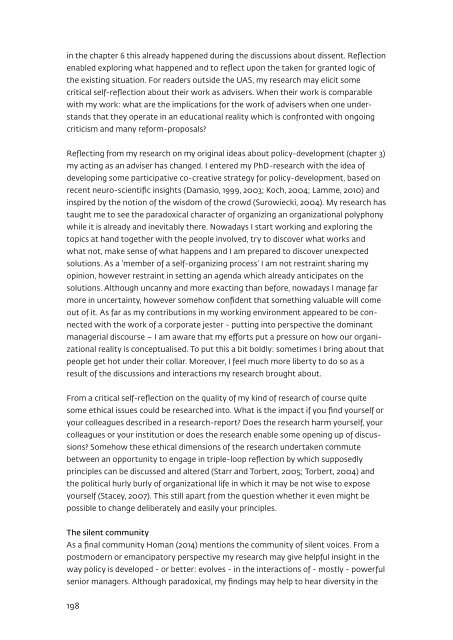Rumbling on performativity_Frits Simon
Rumbling on performativity_Frits Simon
Rumbling on performativity_Frits Simon
You also want an ePaper? Increase the reach of your titles
YUMPU automatically turns print PDFs into web optimized ePapers that Google loves.
in the chapter 6 this already happened during the discussi<strong>on</strong>s about dissent. Reflecti<strong>on</strong><br />
enabled exploring what happened and to reflect up<strong>on</strong> the taken for granted logic of<br />
the existing situati<strong>on</strong>. For readers outside the UAS, my research may elicit some<br />
critical self-reflecti<strong>on</strong> about their work as advisers. When their work is comparable<br />
with my work: what are the implicati<strong>on</strong>s for the work of advisers when <strong>on</strong>e understands<br />
that they operate in an educati<strong>on</strong>al reality which is c<strong>on</strong>fr<strong>on</strong>ted with <strong>on</strong>going<br />
criticism and many reform-proposals?<br />
Reflecting from my research <strong>on</strong> my original ideas about policy-development (chapter 3)<br />
my acting as an adviser has changed. I entered my PhD-research with the idea of<br />
developing some participative co-creative strategy for policy-development, based <strong>on</strong><br />
recent neuro-scientific insights (Damasio, 1999, 2003; Koch, 2004; Lamme, 2010) and<br />
inspired by the noti<strong>on</strong> of the wisdom of the crowd (Surowiecki, 2004). My research has<br />
taught me to see the paradoxical character of organizing an organizati<strong>on</strong>al polyph<strong>on</strong>y<br />
while it is already and inevitably there. Nowadays I start working and exploring the<br />
topics at hand together with the people involved, try to discover what works and<br />
what not, make sense of what happens and I am prepared to discover unexpected<br />
soluti<strong>on</strong>s. As a ‘member of a self-organizing process’ I am not restraint sharing my<br />
opini<strong>on</strong>, however restraint in setting an agenda which already anticipates <strong>on</strong> the<br />
soluti<strong>on</strong>s. Although uncanny and more exacting than before, nowadays I manage far<br />
more in uncertainty, however somehow c<strong>on</strong>fident that something valuable will come<br />
out of it. As far as my c<strong>on</strong>tributi<strong>on</strong>s in my working envir<strong>on</strong>ment appeared to be c<strong>on</strong>nected<br />
with the work of a corporate jester - putting into perspective the dominant<br />
managerial discourse – I am aware that my efforts put a pressure <strong>on</strong> how our organizati<strong>on</strong>al<br />
reality is c<strong>on</strong>ceptualised. To put this a bit boldly: sometimes I bring about that<br />
people get hot under their collar. Moreover, I feel much more liberty to do so as a<br />
result of the discussi<strong>on</strong>s and interacti<strong>on</strong>s my research brought about.<br />
From a critical self-reflecti<strong>on</strong> <strong>on</strong> the quality of my kind of research of course quite<br />
some ethical issues could be researched into. What is the impact if you find yourself or<br />
your colleagues described in a research-report? Does the research harm yourself, your<br />
colleagues or your instituti<strong>on</strong> or does the research enable some opening up of discussi<strong>on</strong>s?<br />
Somehow these ethical dimensi<strong>on</strong>s of the research undertaken commute<br />
between an opportunity to engage in triple-loop reflecti<strong>on</strong> by which supposedly<br />
principles can be discussed and altered (Starr and Torbert, 2005; Torbert, 2004) and<br />
the political hurly burly of organizati<strong>on</strong>al life in which it may be not wise to expose<br />
yourself (Stacey, 2007). This still apart from the questi<strong>on</strong> whether it even might be<br />
possible to change deliberately and easily your principles.<br />
The silent community<br />
As a final community Homan (2014) menti<strong>on</strong>s the community of silent voices. From a<br />
postmodern or emancipatory perspective my research may give helpful insight in the<br />
way policy is developed - or better: evolves - in the interacti<strong>on</strong>s of - mostly - powerful<br />
senior managers. Although paradoxical, my findings may help to hear diversity in the<br />
198



